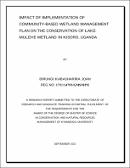| dc.contributor.author | Birungi, Kabasharira Joan | |
| dc.date.accessioned | 2023-02-09T12:58:13Z | |
| dc.date.available | 2023-02-09T12:58:13Z | |
| dc.date.issued | 2022-09 | |
| dc.identifier.citation | Birungi, Kabasharira Joan(2022)Impact of implementation of community-based wetland management plan on the conservation of lake Mulehe wetland in Kisoro, Uganda | en_US |
| dc.identifier.uri | https://hdl.handle.net/20.500.12504/1207 | |
| dc.description | x, 56 p. : ill. (some col.) ; | en_US |
| dc.description.abstract | Increased encroachment, mismanagement and degradation of wetland resources such as
Lake Mulele in Uganda has called for continuous involvement of surrounding people into
their management. The Ugandan government and other conservation agencies such as
IUCN, Wetland Management Department have encouraged the implementation of
CBWMPs since 1992. This study’s objective was therefore to determine the impact of
Community Based Wetland Management Plan on conservation of Lake Mulehe wetland in
Kisoro, South Western Uganda. The study ascertained land cover changes in Lake Mulehe
wetland, examined impacts of CBWMP on community perceptions and practices towards
wetland conservation and established the emerging threats to the conservation of L. Mulehe
wetland. The study undertook both qualitative and quantitative research designs that
included observational survey methods, household interview, FDGs and Key informant
interviews. Land cover analysis identified seven (7) key land cover types (Built up, forest,
tea plantation, woodland, bush land, and subsistence farming). A small increment of 0.07%
in wetland land cover between 2004 and 2018 with subsistence and bushland taking a front
case with 64.04% and 11.20% respectively was also observed. L. Mulehe CBWMP
positively influenced the conservation perceptions and practices of the surrounding
communities thus 68% respondent agreed that there was improvement in vegetation, water
and soils although the imagery analysis revealed otherwise. A 86.7% correlation between
age of respondents and participation in conservation activities also confirm a positive
impact of CBWMP on the wetland. The CBWMP has also boosted the conservation status
of L. Mulehe. In addition, CBWMP has influenced conservation of L. Mulehe wetland
through perception change. Such positive impacts of CBWMP in Mulele can be used by
both NEMA and Ministry of water and environment in enhancing conservation of wetlands
in other areas among different community members. | en_US |
| dc.language.iso | en | en_US |
| dc.publisher | Kyambogo University[unpublished work] | en_US |
| dc.subject | Impacts | en_US |
| dc.subject | Implementation | en_US |
| dc.subject | Community-based | en_US |
| dc.subject | Wetland management | en_US |
| dc.subject | Conservation | en_US |
| dc.title | Impact of implementation of community-based wetland management plan on the conservation of lake Mulehe wetland in Kisoro, Uganda | en_US |
| dc.type | Thesis | en_US |

